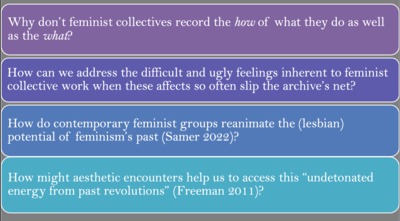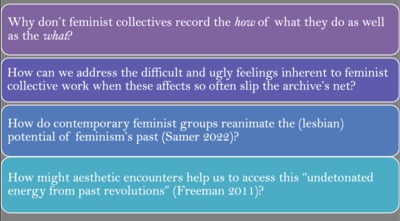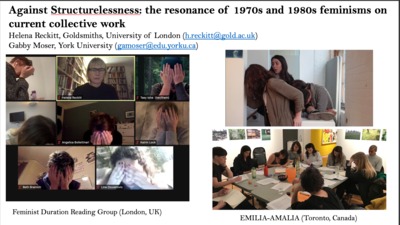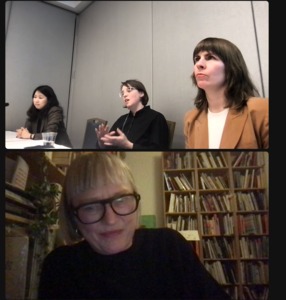Against Structurelessness: the resonance of 1970s and 1980s feminisms on current collective work
Reckitt, Helena and Moser, Gabrielle. 2023. 'Against Structurelessness: the resonance of 1970s and 1980s feminisms on current collective work'. In: College Art Association 112th Annual Conference, Panel 'Group Work: Art and Feminism'. Chicago, United States 14 February 2024. [Conference or Workshop Item]
![[img]](https://research.gold.ac.uk/35820/1.hassmallThumbnailVersion/Screenshot%202024-03-29%20at%2007.52.41.png)
|
Image
Screenshot 2024-03-29 at 07.52.41.png - Supplemental Material Available under License Creative Commons Attribution Non-commercial. Download (247kB) | Preview |
|
![[img]](https://research.gold.ac.uk/35820/2.hassmallThumbnailVersion/Helena%20Reckitt%20%26%20Gabrielle%20Moser_Against%20Structurelessness_CAA_14%20Feb%202024_image%20from%20power%20point%20presentation_2.png)
|
Image
Helena Reckitt & Gabrielle Moser_Against Structurelessness_CAA_14 Feb 2024_image from power point presentation_2.png - Supplemental Material Available under License Creative Commons Attribution Non-commercial. Download (247kB) | Preview |
|
![[img]](https://research.gold.ac.uk/35820/3.hassmallThumbnailVersion/Helena%20Reckitt%20%26%20Gabrielle%20Moser_Against%20Structurelessness_CAA_14%20Feb%202024_image%20from%20power%20point%20presentation.png)
|
Image
Helena Reckitt & Gabrielle Moser_Against Structurelessness_CAA_14 Feb 2024_image from power point presentation.png - Supplemental Material Available under License Creative Commons Attribution Non-commercial. Download (2MB) | Preview |
|
![[img]](https://research.gold.ac.uk/35820/4.hassmallThumbnailVersion/Helena%20Reckitt%20%26%20Gabrielle%20Moser_Against%20Structurelessness_CAA_14%20Feb%202024_screenshot%20of%20panel.png)
|
Image
Helena Reckitt & Gabrielle Moser_Against Structurelessness_CAA_14 Feb 2024_screenshot of panel.png - Supplemental Material Download (1MB) | Preview |
Abstract or Description
“Unstructured groups may be very effective in getting women to talk about their lives; they aren't very good for getting things done.” When Jo Freeman spoke of the “tyranny of structurelessness” in radical women’s groups in 1970, she identified a long-standing problem for feminist collectives: the question of how to make group work “work” so that it could continue past its initial urgencies and ad hoc structure. Feminist collectives profoundly influenced artists, art historians and critics on both sides of the Atlantic in the 1970s and 80s, yet historical accounts of these groups’ activities rarely attend to the how of group work, producing gaps in intergenerational feminist knowledge transmission. How can we address the difficult and ugly feelings inherent to feminist collective work when these affects so often slip the archive’s net? How do contemporary feminist groups reanimate what Elizabeth Freeman (2011) and Rox Samer (2022) term the undetonated potential of feminism’s past?
Reflecting on our experiences with our respective feminist collectives, the Toronto-based EMILIA-AMALIA feminist working group (2016), and the London-based Feminist Duration Reading Group (2015), this paper examines the organizational structures, curatorial practices, and writing strategies each group has developed to sustain long term collaboration and “get things done.” Exploring the feminisms from the 1970s and 1980s that inform our projects, we discuss how we have devised events that aim to acknowledge the shortcomings and prejudices of earlier feminisms, while nonetheless recognising them as flawed, unfinished projects that laid foundations for feminist, trans and queer futures to come.
|
Item Type: |
Conference or Workshop Item (Paper) |
||||||
| Additional Information: |
The paper was given as part of the panel 'Group Work: Art and Feminism,' chaired by Amy Tobin University of Cambridge University and Rachel Warriner of Northumbria University Groups are axiomatic for feminist practice. In many periods, women artists have come together in studios, collectives and through activism to share resources, offer mutual support and develop new ways of working. Group projects have taken many different forms, from artists working together on artworks, to collaborative publications, DIY galleries, scholarly programmes, and international networks. While there has been important scholarship on feminist art groups, the recent resurgence of interest in ‘woman artists’ has tended to obscure the complex contexts in which many artists worked and struggled for a career and an audience. In monographic accounts, these group contexts are often taken to be only a part of a career or diminished as a minor history. In this session, we are interested in what happens when the group is centred. |
||||||
| Departments, Centres and Research Units: |
|||||||
| Dates: |
|
||||||
| Event Location: |
Chicago, United States |
||||||
| Date range: |
14 February 2024 |
||||||
| Item ID: |
35820 |
||||||
| Date Deposited: |
15 Apr 2024 08:59 |
||||||
| Last Modified: |
15 Apr 2024 08:59 |
||||||
|
URI: |
View statistics for this item...
 |
Edit Record (login required) |

 Tools
Tools Tools
Tools



